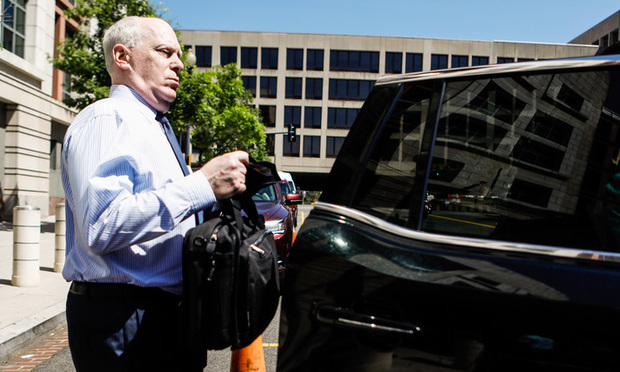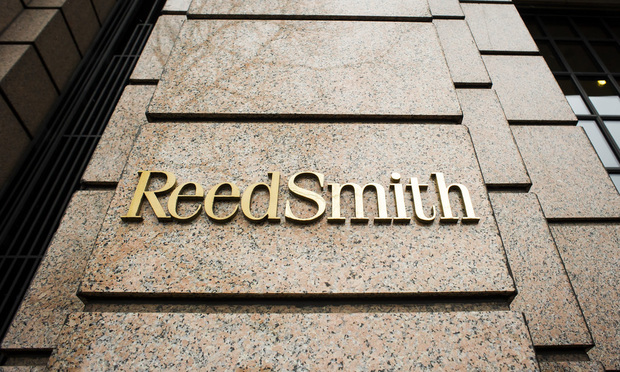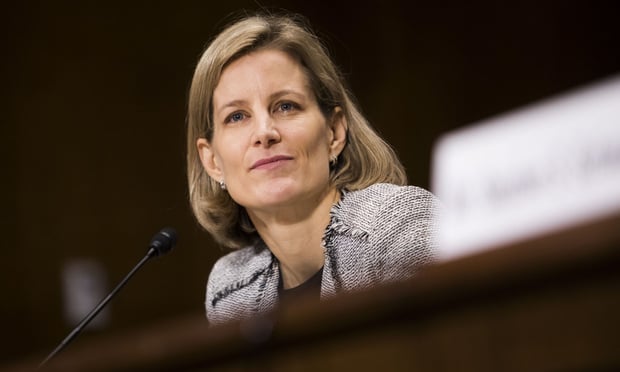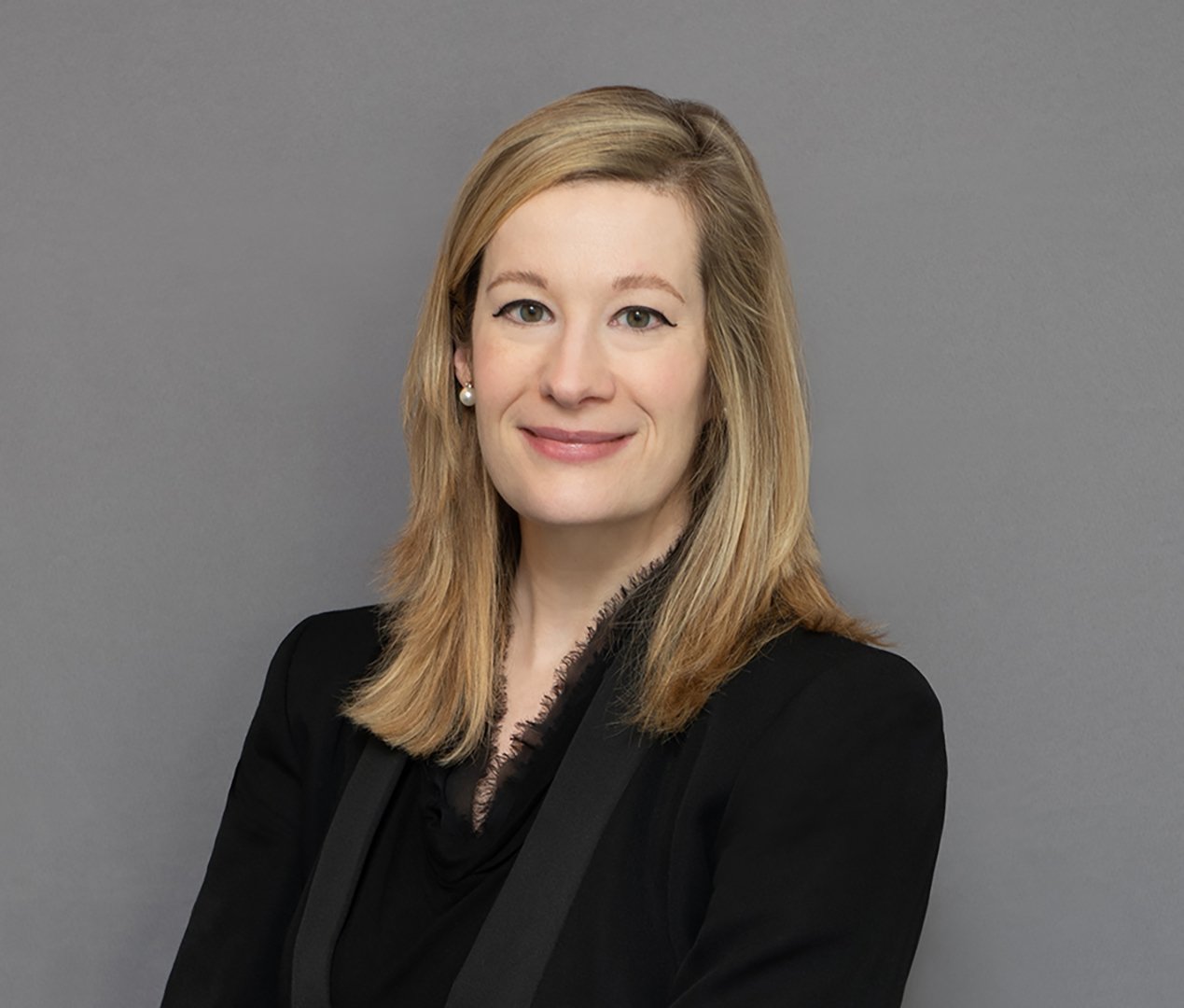'It's Not Croquet.' In Dropped Mueller Case, Reed Smith's Eric Dubelier Didn't Pull Punches Defending Russian Firm
"It comes down to you have to pound, and pound and pound away. And you look for a weakness, and as soon as you find that weakness, you exploit it and pound away at it," Reed Smith's Eric Dubelier says in a wide-ranging interview, after DOJ abandoned charges against his client Concord Management and Consulting.
March 18, 2020 at 01:03 PM
15 minute read
 Eric Dubelier of Reed Smith, a lawyer for Concord Management and Consulting LLC, exits federal court in Washington, D.C., on June 15, 2018. Photo: Diego M. Radzinschi / ALM
Eric Dubelier of Reed Smith, a lawyer for Concord Management and Consulting LLC, exits federal court in Washington, D.C., on June 15, 2018. Photo: Diego M. Radzinschi / ALM
Two years ago, before he was approached about defending an obscure Russian company charged in Special Counsel Robert Mueller's investigation, Eric Dubelier scanned the indictment simply out of interest in the high-profile case.
Dubelier, a partner at the law firm Reed Smith, recalls being struck by what he read. With its allegations of Russians posing as Americans online to sow discord and support President Donald Trump, the indictment appeared to strike at the core of the Mueller team's mandate to investigate Russian interference in the 2016 presidential race. But, to Dubelier, the document fell short, alleging what he summarized, dismissively, as a "make-believe crime."
Dubelier would soon take more than a passing curiosity in the case. Soon he was flying to St. Petersburg, Russia, and Reed Smith was hired by the company accused of bankrolling the alleged scheme: Concord Management and Consulting. In briefs and in open court, he would make frequent use of the phrase "make-believe crime" as he defended the company with a hard-nosed approach that ruffled prosecutors and the federal judge presiding over the case.
On Monday, just weeks before the trial was set to begin, the U.S. Justice Department moved to dismiss its case against Concord, disentangling the company from a prosecution that remains pending against 13 Russians and the Internet Research Agency, the firm allegedly at the heart of the election interference scheme.
The Justice Department said Concord had exploited the litigation to glean insights into how the United States detects and deters foreign interference in elections—without fulfilling its obligation to turn over subpoenaed information ahead of trial. Noting that the company is based in Russia and unlikely to face a meaningful punishment in the event of a conviction, prosecutors said they had determined that continuing the case would promote "neither the interests of justice nor the nation's security."
"In short, Concord has demonstrated its intent to reap the benefits of the court's jurisdiction while positioning itself to evade any real obligations or responsibility," prosecutors said.
So far, the other Russian defendants have refused to answer to the charges in Washington federal court.
In a recent interview, Dubelier, newly freed from a gag order in the case, opened up about how Reed Smith got involved in the case and litigation tactics that drew a scolding last year from U.S. District Judge Dabney Friedrich of the District of Columbia. Dubelier likened litigation to a "mixed martial arts" and shared his suspicion that Mueller's team never expected any of the charged Russian individuals or companies to put up a court defense. The conversation was edited for length and clarity.
NLJ: Let's start at the beginning: How did you and Reed Smith come to link up with Concord Management and Consulting in this politically fraught case?
Dubelier: As far as I understand it, Concord had two Russian law firms that they've worked with in the past that were helping them find U.S. counsel, because they made a determination they were going to defend themselves in the case. And so those two law firms were reaching out to various U.S. law firms, seeing if anybody would be interested. One of those law firms had a person working there who knew one of our lawyers in Europe. Then, eventually, it got to me. And after some preliminaries—the most complicated of which were dealing with 'can we do this?' in that we would need to use a license exception at [the Treasury Department's Office of Foreign Assets Control], we'd need to be transparent with them about the fees because the company is sanctioned—I went and had a meeting with the client. And 10 minutes after the meeting, they called back and said, "You're hired." It was as simple as that.
Aside from having to deal with OFAC, what other hurdles or reputational considerations did Reed Smith take into account?
We have a process through the law firm. And it's kind of like there's no set rules, but you know it when you see it. If you're getting ready to take on a potentially highly controversial, highly publicized matter, that has to be vetted through the senior management team. And so, on occasion, that happens, and this was one of those occasions.
We vetted it through, and they discussed it. I wasn't privy to any of those discussions. But they came back and said, "Let's take it." I think the prime mover of that at the time was when I first read this indictment, I was absolutely convinced this didn't charge a crime, that it was just make-believe. It charged a bunch of facts that may or may not have occurred, but when you added all of those things together, that didn't amount to any election law violation, any [Foreign Agents Registration Act] violation, any [Federal Election Campaign Act] violation, or a conspiracy to defraud the United States. In the process of even, for me, being interested in this, that's what piqued my interest. When the indictment was first returned, long before we were contracted, I read it just out of curiosity and said this is fake. This is like a fake crime. They just made this up. They took a set of facts and went trotting around looking for a crime. That weighed heavily on my mind in agreeing to take it. Sometimes you chase work, sometimes work chases you.
We were contacted, and I could have declined the meeting. I could have declined the case, but I had that interest. And my prediction was—and I think it turned out to be right—that there were going to be fascinating legal issues of first impression that were going to be litigated in the case. And look, we as lawyers are always looking for that case. We're going to do something no one has ever done before.
How long did it take senior management to give you the green light?
They got back very fast. The much more complicated thing that took a significant amount of time was figuring out how to get paid, and that was very, very frustrating, because we had to find a bank that we do business with that would handle the transfers of funds. And even though we could demonstrably prove to them that there was a license exception from OFAC, and there was no prohibition, there were certain banks that just didn't want to touch this thing. They said, "Look, we don't want to do it. We're just not going to do it." And so that took a significant amount of time to work all of that out. We eventually found a bank that was willing to do it.
How much was Reed Smith paid in connection with this case? Can you get into that?
No. I can tell you there was nothing unusual about the arrangement. That is, the fees were the fees—the same fees that we charge other clients. And it was all hourly billing. There was nothing creative about this.
 Reed Smith offices in Washington, DC. Photo: Diego M. Radzinschi/ NLJ
Reed Smith offices in Washington, DC. Photo: Diego M. Radzinschi/ NLJWere you or Reed Smith concerned about how the case might reflect on the firm? Were there worries about how other clients would respond?
That's a really good question. Of course that was considered. But the balance was, in looking at the indictment, we believed that the indictment didn't really charge a crime. And we believed that the fact Mueller, the special counsel, brought it, and it didn't charge a crime—a real crime—those were two huge, massively huge legal issues that were going to have to be litigated. And, that is, the legitimacy of the special counsel's office—huge legal issue—and the structure of the indictment.
So this wasn't your basic, pedestrian case where you're representing some very bad person who's done something individually bad. It's not like taking a murder case … It's not that. On the other hand, you have to recognize there is this dialogue within our society, particularly here in D.C., where all you have to do is say something about the Russians and immediately they jump to the conclusion of "the Russians interfered in the election." It's problematic because that conflates two very different things. It conflates the activities of [the Internet Research Agency] and, remember, I didn't represent IRA. I represented Concord. They were charged with funding the IRA. They weren't charged with actually doing the activity that IRA did … We didn't have anything to do with any of that. And our client wasn't alleged to have anything to do with that. And, in fact, the indictment doesn't allege that even the IRA had any connection to the Russian government. That made it more palatable, I think.
In looking at it in that way, yes, it's going to be controversial and some clients might not like it. But, I have to tell you, the amount of blowback I got was minimal. And I wouldn't even characterize it as blowback. On one or two occasions, a client probably asked a question that we were able to answer, which made them feel OK about what we were doing."
Do you recall the particular event that gave rise to concerns?
It probably was when the judge and I had that terrible appearance in January of 2019, where she went after me about the "Animal House" thing. That really, really blew this thing up. We had so many anonymous voicemails, anonymous emails that were threatening, attack-mode kind of stuff. Really, really disturbing, crazy people. That lasted for about two weeks until that settled down.
 U.S. District Judge Dabney Friedrich in July 2017 at her confirmation hearing in the Senate Judiciary Committee. Photo: Diego M. Radzinschi / ALM
U.S. District Judge Dabney Friedrich in July 2017 at her confirmation hearing in the Senate Judiciary Committee. Photo: Diego M. Radzinschi / ALMAbout that "Animal House" incident. You quoted a line from the film, and shortly thereafter, the judge, Dabney Friedrich, said your approach was "ineffective" and undermining your credibility. You had also cited Tweety Bird in a brief. Why did you decide to use those pop culture references?
I thought the "Animal House" thing was funny, OK? Bringing a little bit of humor to make a point. I didn't think it was as terrible as the judge made it out to be. My team writes creatively anyway, because if you're just writing in your blah-blah normal legal way, it goes in one ear and out the other. You have to look for a way that's going to catch someone's attention, that's going to catch the judge's attention. Sometimes you use humor to do that, parody to do it, there's all kinds of tools to do it. I can't tell you exactly what was in my mind when I did it. I did feel like that line was appropriate at that point in that pleading. I didn't think it was that big of a deal, and I didn't use the curse word. I thought that the judge's reaction to me and at me was stronger than it should have been.
You generally employed some fiery rhetoric in filings and in court appearances, and that appeared to create some tension not just with the judge but the prosecutors. Reflecting on the case, why did you take that approach?
When I litigate any case, you try to develop a rapport with the party on the other side, whether it's a prosecutor or some other kind of plaintiff. And you try to develop a rapport with the court. It doesn't always work that way. I always go into these things with an open mind that I can have a reasonable, positive working relationship with the people on the other side and I can get along with the judge. It doesn't always work that way. I've found in experience, of almost 40 years now of litigating, at the end of the day it comes down to mixed martial arts. It's not croquet, it's not a chess game. It comes down to you have to pound, and pound and pound away. And you look for a weakness, and as soon as you find that weakness, you exploit it and pound away at it.
At one hearing, Mueller prosecutor Jeannie Rhee claimed you abruptly hung up on a teleconference. You disputed that allegation and, after the hearing, confronted her and could be heard inside the courtroom calling the claim "bullshit."
Right.
As you think back on that moment and interactions with prosecutors, how did you approach that?
I think we handled it pretty well. Look, for people who know me and have practiced with me, I'm an emotional person. I just am. I get vested in these things, where I view success in the practice of the area of law that I'm in—government investigations defense—as winning the case. The fees are incidental to that. I think there are lawyers out there who say, "Hey, as long as you're getting paid, why get your blood pressure up? You do what you can do." I've never subscribed to that view. I can't. It's not in my DNA. I get very emotional and very vested in this stuff. And so when she said something that I believe to this day was incorrect, whether she was outright lying or whether she had a misrecollection of it, I don't know. I hope she wasn't outright lying, but she certainly had a misrecollection of it. My reaction was I was angry, and I said that to her. Now, should I have said it to her or not? It came out. I was angry, and I was emotional about it, and that's what came out to make my point. Would it be better to have used different wording or done it in a more quiet way? Sure it would have. But I am who I am, and sometimes you can't control that kind of stuff.
Did anything surprise you about the reaction or publicity surrounding your involvement in the case?
I had no basis to really determine whether or not it would be a problem. I had no basis to think what was going to happen. I can tell you the law firm stood 1,000% behind me, even after that go-round I had with Judge Friedrich in January of 2019. And, look, we didn't take the case to get publicity for Reed Smith. We took the case to win the case for the client, as we would with any other client. To the extent that generates any publicity, you hope it's positive. Sometimes it is, sometimes it's not.
For those following the special counsel investigation, there was some question about whether Mueller's team expected any of the Russian defendants to answer to the charges. Do you think Mueller's team was surprised by your showing up?
I think the answer is they didn't expect it, and the evidence of that to me is the day we filed our notice of appearance, I got a very, very aggressive letter from the special counsel's office demanding, you know, who do you represent and what does the engagement letter say and how are you being paid and who's coming from the company—all this stuff that made it very clear to me that they had not prepared for this.
In recent weeks, prosecutors pushed to have Concord held in contempt over its alleged failure to turn over financial records, internet protocol addresses and other information. The motion to dismiss raised continued questions about the veracity of a declaration by Concord's owner, the Russian oligarch Yevgeny Prigozhin, attesting to the company's compliance with the trial subpoenas. The motion also alleged that Concord was seizing on the litigation to access delicate law enforcement information. What was your reaction to that motion?
My reaction to that is they decided they were going to dismiss the case. All they had to do was file a one-paragraph motion saying we dismiss the case. They didn't do that. What they did is they took cheap shots at our client, Concord, at Prigozhin, under circumstances where neither he nor our client has any ability to defend themselves in the actual court because the case is now dismissed. They knew they were going to get in the last word, and that's what they said.
They can try and spin it any way they want to spin it. The fundamental problem that remains for them is, however they want to spin it, we won and they lost. And that's it from a legal perspective. That's it. It's the end of it.
This content has been archived. It is available through our partners, LexisNexis® and Bloomberg Law.
To view this content, please continue to their sites.
Not a Lexis Subscriber?
Subscribe Now
Not a Bloomberg Law Subscriber?
Subscribe Now
NOT FOR REPRINT
© 2025 ALM Global, LLC, All Rights Reserved. Request academic re-use from www.copyright.com. All other uses, submit a request to [email protected]. For more information visit Asset & Logo Licensing.
You Might Like
View All
Wells Fargo and Bank of America Agree to Pay Combined $60 Million to Settle SEC Probe

'Lack of Independence' or 'Tethered to the Law'? Witnesses Speak on Bondi
4 minute read
Former Thomas Clerk Sarah Harris to Serve as Acting Solicitor General
Law Firms Mentioned
Trending Stories
- 1Reviewing Judge Merchan's Unconditional Discharge
- 2With New Civil Jury Selection Rule, Litigants Should Carefully Weigh Waiver Risks
- 3Young Lawyers Become Old(er) Lawyers
- 4Caught In the In Between: A Legal Roadmap for the Sandwich Generation
- 5Top 10 Developments, Lessons, and Reminders of 2024
Who Got The Work
J. Brugh Lower of Gibbons has entered an appearance for industrial equipment supplier Devco Corporation in a pending trademark infringement lawsuit. The suit, accusing the defendant of selling knock-off Graco products, was filed Dec. 18 in New Jersey District Court by Rivkin Radler on behalf of Graco Inc. and Graco Minnesota. The case, assigned to U.S. District Judge Zahid N. Quraishi, is 3:24-cv-11294, Graco Inc. et al v. Devco Corporation.
Who Got The Work
Rebecca Maller-Stein and Kent A. Yalowitz of Arnold & Porter Kaye Scholer have entered their appearances for Hanaco Venture Capital and its executives, Lior Prosor and David Frankel, in a pending securities lawsuit. The action, filed on Dec. 24 in New York Southern District Court by Zell, Aron & Co. on behalf of Goldeneye Advisors, accuses the defendants of negligently and fraudulently managing the plaintiff's $1 million investment. The case, assigned to U.S. District Judge Vernon S. Broderick, is 1:24-cv-09918, Goldeneye Advisors, LLC v. Hanaco Venture Capital, Ltd. et al.
Who Got The Work
Attorneys from A&O Shearman has stepped in as defense counsel for Toronto-Dominion Bank and other defendants in a pending securities class action. The suit, filed Dec. 11 in New York Southern District Court by Bleichmar Fonti & Auld, accuses the defendants of concealing the bank's 'pervasive' deficiencies in regards to its compliance with the Bank Secrecy Act and the quality of its anti-money laundering controls. The case, assigned to U.S. District Judge Arun Subramanian, is 1:24-cv-09445, Gonzalez v. The Toronto-Dominion Bank et al.
Who Got The Work
Crown Castle International, a Pennsylvania company providing shared communications infrastructure, has turned to Luke D. Wolf of Gordon Rees Scully Mansukhani to fend off a pending breach-of-contract lawsuit. The court action, filed Nov. 25 in Michigan Eastern District Court by Hooper Hathaway PC on behalf of The Town Residences LLC, accuses Crown Castle of failing to transfer approximately $30,000 in utility payments from T-Mobile in breach of a roof-top lease and assignment agreement. The case, assigned to U.S. District Judge Susan K. Declercq, is 2:24-cv-13131, The Town Residences LLC v. T-Mobile US, Inc. et al.
Who Got The Work
Wilfred P. Coronato and Daniel M. Schwartz of McCarter & English have stepped in as defense counsel to Electrolux Home Products Inc. in a pending product liability lawsuit. The court action, filed Nov. 26 in New York Eastern District Court by Poulos Lopiccolo PC and Nagel Rice LLP on behalf of David Stern, alleges that the defendant's refrigerators’ drawers and shelving repeatedly break and fall apart within months after purchase. The case, assigned to U.S. District Judge Joan M. Azrack, is 2:24-cv-08204, Stern v. Electrolux Home Products, Inc.
Featured Firms
Law Offices of Gary Martin Hays & Associates, P.C.
(470) 294-1674
Law Offices of Mark E. Salomone
(857) 444-6468
Smith & Hassler
(713) 739-1250











